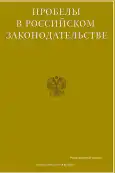Corruption as a Social Phenomenon that Generates Negative Trends in Society
- Authors: Akhmedkhanova S.T.1
-
Affiliations:
- North Caucasus Institute (branch) VSU (RPA of the Ministry of Justice of Russia)
- Issue: Vol 15, No 1 (2022)
- Pages: 85-91
- Section: Articles
- URL: https://journal-vniispk.ru/2072-3164/article/view/147423
- ID: 147423
Cite item
Abstract
Corruption is a socially negative phenomenon that contributes to an increase in the scale of the criminogenic situation, penetrating into all spheres of society, including education. For the education system, even the most insignificant manifestation of corruption is quite dangerous, since education is the basis for the development of any society and state, contributes to the achievement of certain goals by achieving a high level of intellectual development, creates equal opportunities to meet living conditions. The main focus of the study is public relations, reflecting significant violations of legal norms and moral and ethnic prescriptions, through the commission of corruption-related crimes by officials and non-governmental employees performing managerial functions, using their powers for personal enrichment, causing significant harm to national security objects. The purpose of this study is to define the author's concept of corruption as a recurring, constantly changing, negative socio-legal phenomenon, expressed in the selfish use by officials and non-state employees of their official, official position for the purpose of illegally obtaining funds, intangible benefits, property or the right to property, harming the interests of society and the state, destroying normal social relations that promote the realization of the rights and legitimate interests of citizens.
Full Text
##article.viewOnOriginalSite##About the authors
Samira Telkhatovna Akhmedkhanova
North Caucasus Institute (branch) VSU (RPA of the Ministry of Justice of Russia)
Email: cabinaken@mail.ru
Candidate of Legal Sciences Associate Professor of the Department of Criminal Law Makhachkala, Dagestan Republic
References
- Abdullayeva N. D. Legal responsibility of medical workers: problems of qualification. Moscow: FSUE of the Research Institute of the Ministry of Internal Affairs of the Russian Federation, 2012.
- Aminov D.I., Gladkikh V.I., Solovyov K.S. Corruption as a social and legal phenomenon and ways to overcome it. - M.: Lawyer, 2002. 63 p.
- Akhmedkhanova S.T., Saidov M. Corruption in customs authorities: causes and possible methods of prevention //Science Week-2018: collection of materials of the XXXIX final scientific and technical conference. conf. of teachers, staff, postgraduates and students of DSTU. - Makhachkala: DSTU, 2018. - S. 464-466.
- Akhmedkhanova S.T., Jamalova B. B. The main causes and conditions that generate corruption crime in the educational environment// Problems of economics and legal practice. - 2020. - No. 2. - S. 293-296.
- Gribanovsky S. P. Corruption in the higher education system: the experience of sociological analysis. // Bulletin of the Mogilev State University of Food. - 2017. - № 1 (22). S. 109-119.S
- Dyzhova A. A. Bribery in the education system as the most dangerous form of corruption. // Scientific and technological progress: current and promising areas of the future. Collection of materials of the VI International Scientific and Practical Conference. 2017. S. 65-67.
- Izyumov I. V. Legal forms of combating corruption in the education system //Eurasian Legal Journal. 2020. No. 5 (144). S. 381-382.
- Surilov M. N. Corruption in the Russian education system as a threat to the innovative development of the state / / Problems and mechanisms of evaluating the effectiveness of the system of state and municipal management: theory and practice. collection of abstracts of reports and articles of the international scientific and practical conference of Russian and foreign universities and Plekhanov Russian University of Economics with the participation of representatives of state and municipal authorities. Responsible editor: R. A. Abramov. 2016. S. 308-311.
- Pavlova E. R. Anti-corruption in the context of legal education of young people in the education system of the Russian Federation//Continuity in education. 2021. No. 28 (3). S. 421-423.
Supplementary files








